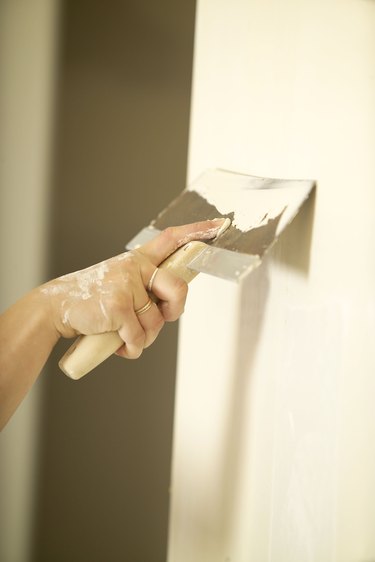
Drywall joint compound comes in many different formulations, but none of them last forever. The mud can dry out, become moldy or otherwise become unusable over time. The length of time that it lasts has a great deal to do with how it is stored. The amount of time that drywall compound lasts is unpredictable because of the various factors that affect its shelf life.
Air
Video of the Day
Air is one of the great problems for drywall compound. If it is exposed to air it will dry out and become unusable much faster. Sometimes only the top of the compound will dry out and if you remove it there may still be usable mud underneath it in the container. If you keep your mud in a perfectly sealed pail, it may last much longer than products kept in less secure containers.
Video of the Day
Mold
Drywall compound in a package that has been opened is exposed to a number of contaminants. Microorganisms may infiltrate the compound while it is open. Once it is put back into storage, the result may be mold growing on the compound. Some types of drywall compound are specifically manufactured to resist mold growth. These products are for use in bathrooms and kitchens where moisture may be a risk for the walls. Their built-in mold resistant properties make them last longer than other compounds which are susceptible to molding.
Water
One way to extend the life of your mud is to store it in a pail that you can seal tightly, and then put a thin layer of water on top of it. The water helps keep the compound from drying out so that it is still usable when you need it again. If you choose this option, never stick a dirty drywall knife in the bucket or put compound back in the bucket once you take it out. This helps prevent contamination, which is important when you add water to the container because water speeds the growth of molds.
Other Signs of Spoilage
Other signs should tip you off that the drywall mud has expired. Mud that develops a strong smell different from its normal odor has started to spoil. Mud that has uneven color or that has changed color completely is also expired. Finally, check the expiration date. You shouldn't use expired mud or mud that shows physical signs of spoilage, as it could compromise the strength of your work.